
The men's 200 metre freestyle event at the 2004 Summer Olympics was contested at the Olympic Aquatic Centre of the Athens Olympic Sports Complex in Athens, Greece. The event took place on 15 and 16 August. There were 59 competitors from 53 nations, with each nation having up to two swimmers.
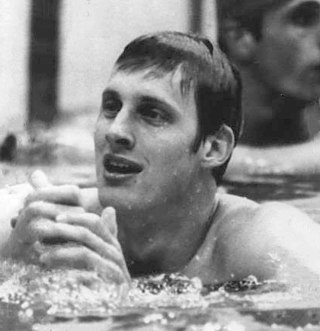
The men's 100 metre freestyle event at the 1976 Summer Olympics took place between July 24 and 25. This was the first time in history that the 100m freestyle was swum under 50 seconds. There were 41 competitors from 27 nations. Nations had been limited to three swimmers each since the 1924 Games. The event was won by Jim Montgomery of the United States, the nation's second consecutive and tenth overall victory in the men's 100 metre freestyle. His countryman Jack Babashoff took silver. Peter Nocke's bronze was the first medal for West Germany in the event, though the United Team of Germany had won a bronze in 1964.

The men's 200 metre freestyle event at the 1992 Summer Olympics took place on 26 July at the Piscines Bernat Picornell in Barcelona, Spain. There were 55 competitors from 39 nations, with each nation having up to two swimmers. The event was won by Yevgeny Sadovyi of the Unified Team; it was the first victory in the men's 200 metre freestyle by an athlete from the former Soviet Union since Moscow 1980. Anders Holmertz of Sweden repeated as the silver medalist, becoming the first man to win multiple medals in the event. Antti Kasvio earned a bronze medal in Finland's debut in the event.

The men's 200 metre freestyle event at the 2000 Summer Olympics took place on 17–18 September at the Sydney International Aquatic Centre in Sydney, Australia. There were 51 competitors from 44 nations, with each nation having up to two swimmers.

The men's 100 metre freestyle event at the 1984 Summer Olympics was held in the McDonald's Olympic Swim Stadium in Los Angeles, California, on July 31, 1984. There were 68 competitors from 45 nations. Nations were limited to two swimmers each, down from three in prior Games. The event was won by Rowdy Gaines of the United States, the nation's third victory in four Games—with only the boycotted 1980 Olympics missing. Overall, it was the eleventh victory for an American in the men's 100 metre freestyle, most of any nation. Mark Stockwell of Australia took silver. Swedish swimmer Per Johansson repeated as bronze medalist, only the seventh man to earn multiple medals in the event.

The men's 200 metre freestyle event at the 1984 Summer Olympics was held in the McDonald's Olympic Swim Stadium in Los Angeles, California, on July 29, 1984. There were 56 competitors from 36 nations, with each nation having up to two swimmers. The event was won by Michael Gross of West Germany, the nation's first victory in the event. His countryman Thomas Fahrner took bronze. Americans placed second and fourth, with Mike Heath earning silver and Jeff Float in fourth place.
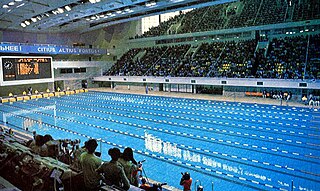
The men's 200 metre freestyle event at the 1980 Summer Olympics was held on 21 July at the Swimming Pool at the Olimpiysky Sports Complex. There were 42 competitors from 24 nations, with each nation having up to three swimmers. The event was won by Sergey Koplyakov of the Soviet Union, with his countryman Andrey Krylov finishing second. The medals were the first for the Soviet Union in the men's 200 metre freestyle. Graeme Brewer of Australia won that nation's first medal in the event since 1968 with his bronze.
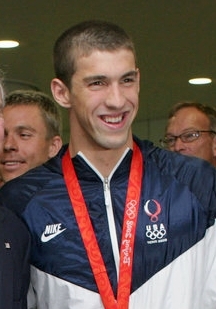
The men's 200 metre freestyle event at the 2008 Olympic Games took place on 10–12 August at the Beijing National Aquatics Center in Beijing, China. There were 58 competitors from 50 nations. The winning margin was 1.89 seconds which as of 2023 remains the only time this race has been won by more than 1.8 seconds at the Olympics.
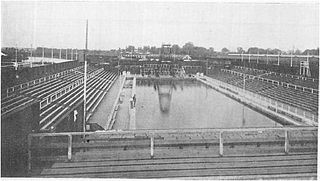
The men's 100 metre freestyle was a swimming event held as part of the swimming at the 1928 Summer Olympics programme. It was the seventh appearance of the event, which had not been featured only at the 1900 Games. The competition was held on Friday and Saturday, 10 and 11 August 1928. Thirty swimmers from 17 nations competed. Nations had been limited to three swimmers each since the 1924 Games. Johnny Weissmuller of the United States repeated as gold medalist in the event, the second man to do so. It was the fifth consecutive victory for an American swimmer in the men's 100 metre freestyle. István Bárány earned Hungary's first medal in the event since 1908 with his silver. Katsuo Takaishi's bronze was Japan's first men's 100 metre freestyle medal. Bárány and Takaishi prevented the Americans from sweeping the medals a third consecutive time, as the United States swimmers finished first, fourth, and fifth.
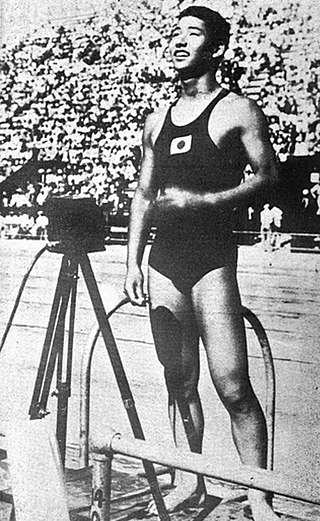
The men's 100 metre freestyle was a swimming event held as part of the swimming at the 1932 Summer Olympics programme. It was the eighth appearance of the event, which had not been featured only at the 1900 Games. The competition was held from Saturday August 6, 1932 to Sunday August 7, 1932. Twenty-two swimmers from ten nations competed. Nations had been limited to three swimmers each since the 1924 Games. The event was won by Yasuji Miyazaki of Japan, snapping a five-Games American win streak. Japan was only the third nation to win a gold medal in the event. The final was entirely made up of Japanese and American swimmers, three each; Japan took the top two places as Tatsugo Kawaishi earned silver. The top American, Albert Schwartz, earned bronze. While the American win streak had ended at five, the nation's podium streak ran to seven Games.

The men's 100 metre freestyle was a swimming event held as part of the swimming at the 1936 Summer Olympics programme. It was the ninth appearance of the event, which had not been featured only at the 1900 Games. The competition was held on Saturday and Sunday, 8 and 9 August 1936. Forty-five swimmers from 23 nations competed. Nations had been limited to three swimmers each since the 1924 Games. The event was won by Ferenc Csik of Hungary, the nation's first victory in the event since 1904 and third overall. For the second consecutive Games, Japan took two medals in the 100 metre freestyle, this time silver and bronze. The United States' seven-Games medal streak in the event ended as the nation's best result was sixth place by Peter Fick.

The men's 100 metre freestyle event at the 1948 Olympic Games took place between 30 and 31 July at the Empire Pool. There were 41 competitors from 19 nations. Nations had been limited to three swimmers each since the 1924 Games. The event was won by Wally Ris, returning the United States to the podium in the event after a one-Games absence broke a seven-Games streak. It was the sixth victory for an American in the 100 metre freestyle, most of any nation. Another American, Alan Ford, took silver. Géza Kádas of Hungary earned bronze, the nation's third medal in four Games. Japan's three-Games medal streak in the event ended with no Japanese swimmers competing due to the nation not being invited after World War II.

The men's 100 metre freestyle event at the 1952 Summer Olympics took place between 26 and 27 July at the Helsinki Swimming Stadium. There were 61 competitors from 33 nations. Nations had been limited to three swimmers each since the 1924 Games. The event was won by Clarke Scholes of the United States, the nation's second consecutive and seventh overall victory in the men's 100 metre freestyle. Japan, absent from the 1948 Games after World War II, returned to the podium in the event with Hiroshi Suzuki's silver. Göran Larsson earned Sweden's first medal in the event since 1908 with his bronze.

The men's 100 metre freestyle event at the 1956 Olympic Games took place between 29 and 30 November. There were 34 competitors from 19 nations. Nations had been limited to three swimmers each since the 1924 Games. The event was won by Jon Henricks of Australia, the nation's first medal in the event. Australia would win a second 0.4 seconds later and a third 0.9 seconds after that, sweeping the podium—the first sweep in the men's 100 metre freestyle since the United States did it in 1920 and 1924, and the first sweep of any event by Australian competitors. This year, the Americans finished fourth through sixth. It was the first time since 1924 that Japan had competed but not medaled.

The men's 100 metre freestyle event at the 1960 Olympic Games took place between August 26 and 27. There were 51 competitors from 34 nations. Nations were limited to two swimmers each, down from three in previous Games. The event was won by John Devitt of Australia over Lance Larson of the United States in a controversial, disputed finish that resulted in a push for electronic timing. It was Australia's second consecutive victory in the event, third-most all-time behind the United States' 7 gold medals and Hungary's 3. Devitt, silver medalist four years earlier, was the fifth man to win multiple medals in the event. Manuel dos Santos earned Brazil's first medal in the men's 100 metre freestyle with his bronze.
The women's 100 metre freestyle event at the 1960 Olympic Games took place between August 26 and 29. This swimming event used freestyle swimming, which means that the method of the stroke is not regulated. Nearly all swimmers use the front crawl or a variant of that stroke. Because an Olympic-size swimming pool is 50 metres long, this race consisted of two lengths of the pool.

The men's 100 metre freestyle event at the 1964 Olympic Games took place between October 11 and 12. There were 66 competitors from 33 nations. Nations were again able to bring up to three swimmers each after a one-Games limit of two in 1960. The event was won by Don Schollander of the United States, the nation's first victory in the event since 1952 and eighth overall. Great Britain and the United Team of Germany both earned their first medal in the men's 100 metre freestyle.

The men's 100 metre freestyle event at the 1968 Olympic Games took place between 18 and 19 October. There were 64 competitors from 34 nations. Nations had been limited to three swimmers each since the 1924 Games. The event was won by Michael Wenden of Australia, the nation's third victory in four Games. Americans Ken Walsh and Mark Spitz took silver and bronze, respectively.

The men's 200 metre freestyle event at the 1968 Olympic Games took place on 24 October at the Alberca Olímpica Francisco Márquez. It was the third time the event was held, returning for the first time since 1904. There were 57 competitors from 26 nations, with each nation having up to three swimmers. The event was won by Michael Wenden of Australia, the nation's second victory in the event ; Australia extended its podium streak in the event to three Games over 68 years. It was Wenden's second gold medal of the Games, completing a 100/200 free double. Americans Don Schollander and John Nelson took silver and bronze, respectively.

The men's 100 metre freestyle event at the 1972 Olympic Games took place between September 2 and 3. There were 48 competitors from 29 nations. Nations had been limited to three swimmers each since the 1924 Games. The event was won by Mark Spitz of the United States, his then-record sixth gold medal in a single Games. It was the ninth victory in the event for an American, most of any nation. Jerry Heidenreich, also of the United States, took silver. Soviet swimmer Vladimir Bure earned bronze, the nation's first medal in the men's 100 metre freestyle.



















